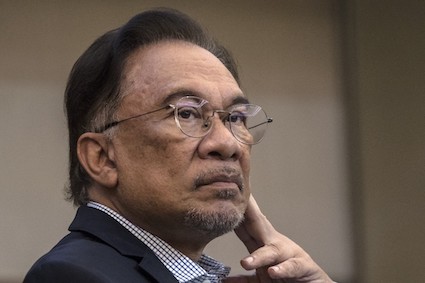Anwar Ibrahim: An obsession to become Malaysia’s Prime Minister

(BBC) – Known for both his tumultuous political career and his dogged decades-long quest to lead Malaysia, Anwar Ibrahim has become one of the most well-known and controversial figures in South East Asia.
On the cusp of becoming prime minister several times, he was brought down by not one but two sodomy convictions.
He was imprisoned for years under the leadership of political titan Mahathir Mohamad, who was also Mr Anwar’s one-time mentor.
The roller-coaster relationship between the two men would come to define not only Mr Anwar’s fortunes, but also Malaysian politics.
Rapid ascent
Mr Anwar, now 73, first made his name as a charismatic firebrand student leader who founded Malaysia’s Islamic youth movement, ABIM.
He surprised many by joining the United Malays National Organisation (UMNO), the long-ruling party, in 1982.
But it proved to be a canny political move – he climbed rapidly up the political ladder and held multiple ministerial posts.
In 1993 he became Mr Mahathir’s deputy and was widely expected to succeed him. But tensions set in after the Asian financial crisis of 1997, as they clashed over the economy and corruption.
Jail
In September 1998, Mr Anwar was sacked and led public protests against Mr Mahathir. It was the start of Reformasi, a reform movement that would influence a generation of Malaysian democracy activists.
Mr Anwar was arrested and eventually charged with sodomy and corruption – charges he denied in the controversial trial that followed.
While Muslim-majority Malaysia criminalises homosexual activity, convictions are rare and the case against Mr Anwar was internationally condemned as politically motivated.
Violent street protests erupted when he was jailed for six years for corruption. A year later he was sentenced to nine years for sodomy.
Mr Anwar has always maintained the charges were part of a smear campaign to remove him as a political threat to Mr Mahathir.
In late 2004, a year after Mr Mahathir stepped down as premier, Malaysia’s Supreme Court overturned the sodomy conviction and freed Mr Anwar from jail.
A growing opposition, new charges
Upon his release, he emerged as the de facto head of a newly invigorated opposition that registered a strong showing in the 2008 elections.
But claims of sodomy were again made against Mr Anwar in 2008, in what he said was another attempt by the government to sideline him.
A High Court eventually cleared Mr Anwar of the charges in January 2012, citing a lack of evidence.
The following year he led the opposition to new heights in an election that delivered the worst-ever showing for the ruling Barisan Nasional coalition.
But once again Mr Anwar’s ambitions were thwarted. As he was preparing to fight a state election in 2014, his earlier acquittal was overturned and he was sent back to jail.
Political comeback
In a shock turn of events in 2016, his former rival Mr Mahathir announced he was coming out of retirement to run for top office again.
The then 92-year-old said he was sick of the corruption allegations plaguing the prime minister then, another former protégé, Najib Razak.
But to stage his comeback Mr Mahathir struck an unlikely deal with the still imprisoned Mr Anwar, who had remained hugely popular with opposition supporters.
In a much publicised moment the two exchanged a once unthinkable handshake, marking the start of an extraordinary political reunion.
Mr Mahathir led the Pakatan Harapan alliance to victory in 2018’s landmark elections, ending Barisan Nasional’s unbroken 61-year streak in ruling the country.
Mr Mahathir was now Malaysia’s prime minister again, and indicated he would hand power to Mr Anwar within two years. He also met his pledge to free Mr Anwar from prison, initiating a full pardon.
Euphoric crowds chanting “long live Anwar” greeted the new leader-in-waiting on his release from jail as he looked closer than ever to achieving his premiership dreams.
“Now there is a new dawn for Malaysia. I must thank the people of Malaysia,” Mr Anwar told a news conference on his release.
“The entire spectrum of Malaysians, regardless of race or religion, have stood by the principles of democracy and freedom. They demand change.”
A coalition cut short
The new Pakatan Harapan coalition welded together four parties into Malaysia’s first truly multi-ethnic coalition that commanded support among the Malay Muslim majority as well as the country’s sizeable Chinese and Indian minorities.
Some viewed it as a sign that Malaysia was ready to unite across the racial lines that have dominated political life since the divisions fomented under colonial rule.
But the alliance, forged on Mr Mahathir’s promise to cede power to Mr Anwar, then began to look precarious as the nonagenarian kept shifting the goalposts for handover. It began to unravel amid bitter in-fighting over succession and a resurgence of Malay nationalism.
In February Mr Mahathir’s unexpected resignation led to the coalition’s collapse, plunging Malaysia into an unprecedented period of political turmoil.
Malaysia’s king, who has ultimate say on who should form a government, chose Muhyiddin Yassin to lead, effectively restoring the old order to power.
But in the latest twist in the ongoing political turbulence, in September 2020 Mr Anwar said he commanded a “formidable” parliamentary majority and was seeking an audience with the king to form a new government.
His claims have been dismissed by Mr Muhyiddin, who says he is still very much in charge, while the king at this time is in hospital.
It remains to be seen whether Mr Anwar will yet rise to become premier in his quest for the top job.

